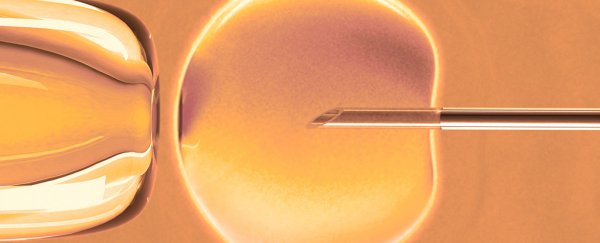Researchers are calling for better long-term monitoring of children born with the help of Assisted Reproductive Technology (ART) following a study linking fertility procedures with a higher risk of intellectual disability.
There's good reason to suspect ongoing improvements in medical technology might already be lowering that potential risk of cognitive impairment. But until we pay closer attention, we could miss important evidence that helps explain the connection.
Perth Hospital's Telethon Kids Institute compared databases of children with intellectual disability with those born via ART to test suspicions that some forms of fertility treatment might have adverse effects on neurological development.
They had good reason to double check. Several studies have come to conflicting conclusions over concerns that using technologies such as in-vitro fertilisation (IVF) to conceive might increase the risk of a child developing significant learning problems.
Since first becoming available to the general public some 40 years ago, an increasing number of hopeful parents are turning to ART - due to delays in starting families, declines in fertility, and even rising obesity.
Standard in-vitro fertilisation involves introducing sperm and egg cells in an external environment before implanting one or more of the resulting embryos into the mother's uterus.
For fertilisations that need more of a helping hand, technicians can physically insert a sperm cell into an egg's cytoplasm in a procedure called intracytoplasmic sperm injection (ICSI).
Given the potential stresses of such rough handling, there have long been fears that there could be a concerning level of epigenetic editing taking place, silencing important genes to a detrimental degree and resulting in heightened risk of health problems.
But picking out elevated risks due to ART procedures isn't as simple as it might first seem. Many who seek help in conceiving have other health concerns, or are in an older demographic, making it hard to sift meaningful links out of the data.
A recent systematic review of existing research showed just how challenging the task really is, with many studies excluding children who were already at risk of intellectual impairment thanks to being born preterm or as part of a multiple birth.
This time, researchers pooled data on more than 210,000 children born in Western Australia between 1994 and 2002, taking into account more than eight years of childhood development.
Comparing 2,876 children born thanks to some form of ART with those conceived the old-fashioned way, the team evaluated whether children who had an IQ of less than 70 were over-represented in one group.
They found children conceived through ART were in fact a touch more likely to develop a mild to severe cognitive impairment. On closer inspection, it also looked like some procedures posed a greater risk than others.
Children conceived using ICSI had the greatest chance of impairment, for example, with 1 in 32 children diagnosed with some level of intellectual disability compared with 1 in 59 children conceived without any help from fertility treatments.
Add in the already greater risk of preterm delivery for children born with IVF/ICSI assistance – a factor that can more than double the risk of intellectual disability alone – and the case for heightened risk looks pretty solid.
Reading between the lines, it seems there's a silver lining to this research. ART has progressed in leaps and bounds over the ensuing years, suggesting those risks should be declining.
Implanting multiple embryos to maximise the chance of a successful birth was once the norm. But times have changed.
"As of 2016, 88 percent of treatment cycles saw only a single embryo transferred, resulting in much lower proportions of multiple and preterm births," says the study's lead author Michele Hansen.
There is also still the question of whether the high rate of intellectual disability was a direct result of the technology, or simply a consequence of clearing a path for fertilisation to take place.
"Genetic abnormalities occur more frequently in men who are infertile, so ICSI – which bypasses natural selection barriers by injecting a sperm directly into an egg – may allow for the transmission of anomalies to the offspring," says Hansen.
With questions still remaining, more research using more recent data is desperately needed to identify what's behind this discrepancy, and maybe even discover new ways to limit the risks further.
This research was published in Pediatrics.
